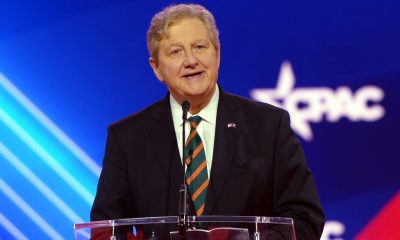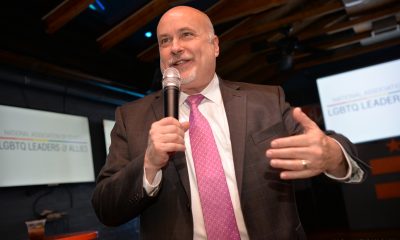National
GOP candidate seeks LGBT help in ousting Pelosi
Dennis wins Log Cabin endorsement, faces uphill battle

The Republican candidate running against Rep. Nancy Pelosi (D-Calif.) is looking for help from LGBT voters in his quest to unseat the House speaker.
John Dennis, in his first run for political office, is running against Pelosi to represent California’s 8th congressional district. He’s described on his website as “an accomplished businessman and entrepreneur” as well as “a pro-liberty San Franciscan.”
Dennis has earned the endorsement of the Log Cabin Republicans and last week spoke at the organization’s annual dinner in D.C. to cultivate support among gay Republicans.
During his remarks, the Republican candidate said one thing he was delighted to discover over the course of his campaign is that gay rights pioneer Harvey Milk supported Republican candidate Barry Goldwater in his 1964 bid for the presidency against then-President Lyndon Johnson.
“On the surface, it doesn’t make sense, but if you think about the pre-Stonewall era, it makes complete sense,” Dennis said. “The community had a tough time with government. Government was oppressing it and always on its back. But Barry’s libertarian streak actually connected with the community.”
Dennis emphasized the libertarian elements of the GOP and said those tenets mean the LGBT community “rightfully belongs in the Republican Party with our emphasis on individual liberty.”
Dennis said he’s running against an opponent who represents Democratic control of Washington and dissatisfaction with the federal government.
He said he’s noticed a lot of e-mails from Republican challengers saying their Democratic opponents vote either 94 percent of the time or 96 percent of the time with Pelosi.
“I can guarantee you one thing,” Dennis said. “My opponent votes 100 percent of the time with Nancy Pelosi.”
Dennis spoke with the Blade about his support for LGBT issues following his speech at the Log Cabin dinner. Pelosi hasn’t scheduled a time to talk with the Blade during the 111th Congress despite repeated requests for an interview over the past year.
Among Dennis’ pro-LGBT positions is his support for repeal of laws seen as discriminatory against LGBT people. He said he backs repeal of “Don’t Ask, Don’t Tell” as well as the Defense of Marriage Act.
“I don’t think marriage is a government issue,” he said. “It’s certainly not a federal government issue. So, those are issues that I’d be happy to support in the gay community.”
Dennis also said in 2008 he voted against Proposition 8 in California, which ended same-sex marriage in the state. He said his position against Prop 8 is consistent with his view that government should not be in “the marriage business.”
“It was very exclusionary, that law, and didn’t go to solve the problem,” Dennis said. “It just said, ‘OK, well, this is for us and then you guys do whatever you’re going to do.’ And I thought it was a little aggressive.”
Dennis added he thinks U.S. District Court Judge Vaughn Walker’s recent ruling that Prop 8 is unconstitutional was “the right decision” and said he expressed his support for the ruling on his blog.
Still, Dennis hesitated when asked if he supports the Employment Non-Discrimination Act, which would bar job discrimination against LGBT people in most settings.
Dennis said his support on ENDA will depend on how the legislation “is presented” and said there’s a “flip-side” to the legislation.
“Do you end up forcing homophobes or anti-homosexual groups — do you end up protecting their right to be employed by homosexuals when there’s an obvious conflict there?” Dennis said. “So, it depends on how it’s worded. But, you know, I’m … against discrimination.”
Dennis emphasized his credentials as a Republican and said he wants to stop the “fiscal irresponsibility of Washington.”
“We need to get spending under control,” he said. “We need to balance our budgets. We need to start following the Constitution, and only spend on what the Constitution authorizes the Congress to spend on.”
Dennis said in the primary he ran as a “pro-civil liberties, anti-war, pro-legalization Republican” and won, so he doesn’t think he has “anything to prove to anyone” regarding his place in the Republican Party.
Log Cabin endorsed Dennis on Sept. 16 as part of a group 11 Republican candidates seeking House seats.
Other endorsements included Rep. Judy Biggert (R-Ill.), who voted for an amendment to end “Don’t Ask, Don’t Tell,” and Rep. Ileana Ros-Lehtinen (R-Fla.), a co-sponsor of numerous pro-LGBT bills.
R. Clarke Cooper, Log Cabin’s executive director, said Dennis’ support for ending “Don’t Ask, Don’t Tell” was a major factor in the organization’s decision to endorse the Pelosi challenger.
“Bottom line is John Dennis is a pro-repeal Republican candidate,” Cooper said. “So he is on our radar screen and we are supporting him as well some other incumbents and candidates who would be a good force-multiplier in the party and help us get the party to be more inclusive toward gays and lesbians.”
Cooper said Dennis has been an “active ally” of the Log Cabin Republicans of San Francisco and has recruited numerous chapter members into his campaign.
Despite his support for LGBT issues, Dennis is running against a lawmaker who for decades has been seen as a stalwart supporter of LGBT people.
Drew Hammill, a Pelosi spokesperson, emphasized the speaker’s record on pro-LGBT legislation.
“Speaker Pelosi has been a staunch advocate for the LGBT community in her more than 20 years in the Congress; helping lead the fight against HIV/AIDS, opposing efforts to enshrine discrimination in the United States Constitution and served as a leading voice against Proposition 8 in California,” Hammill said.
Hammill said Pelosi led efforts to pass hate crimes legislation as well as pass legislation in the House to repeal “Don’t Ask, Don’t Tell.” Hammill said the speaker “will keep pushing for action on ENDA.” Pelosi is being honored with an award from the Gay & Lesbian Victory Fund this week in Washington for her work on LGBT issues.
“San Franciscans know Nancy Pelosi’s commitment to fostering equality and ending discrimination,” Hammill said.
But one group that has criticized Pelosi for not moving forward with a House vote on ENDA is washing its hands of the race.
Robin McGehee, co-founder of GetEQUAL, which has staged acts of civil disobedience throughout the country over Pelosi’s inaction this Congress over ENDA, said voters in the speaker’s district should “determine for themselves how well she is representing [them] and fighting for their equality.”
“Our equality knows no political party; we are not beholden to the Democratic Party or the Republican Party,” McGehee said. “Whoever wins the election can expect us to hold them accountable on their commitments to the LGBT community.”
Dennis faces an uphill fight to unseat Pelosi -— to say the least — in the Democratic stronghold of California’s 8th congressional district, which includes San Francisco. Members of the Green Party often fare better than Republicans in the district.
Pelosi has consistently won election in the area since she first sought a U.S. House seat in 1988. Pelosi often wins these races with more than 80 percent of the vote.
Dennis also has major deficit against Pelosi in terms of fundraising. The speaker has raised nearly $2 million this campaign cycle while Dennis has $650,000, according to the most recent Federal Election Campaign reports.
Pelosi has $214,000 in cash on hand while Dennis has $58,000. Pelosi also has no campaign debt while Dennis has $53,000.
Still, Dennis said he sees a path to victory because his internal polling numbers show that Pelosi’s support is growing soft among independents and Democrats.
“If we win all the votes of people who say they won’t vote for her, plus have a good turnout for the Republicans, we’ll actually have enough votes to defeat her,” Dennis said.
Cooper acknowledged that Dennis is facing an “uphill battle” and said he thinks the Republican candidate realizes the challenge.
Still, Cooper said he thinks Pelosi could be vulnerable because of the number of House Democrats who are distancing themselves from Pelosi in campaign ads.
“There are Democrats trying to maintain their seats who don’t want her to come into their district, they don’t want her support and they don’t want to look like they’re affiliated with her as speaker even though they’re running as a Democrat,” Cooper said.
During his speech, Dennis acknowledged that running in San Francisco is “challenging” for a Republican and said he has to do “special things” to build support.
A recent web ad from the Dennis campaign depicts Pelosi as the Wicked Witch of the West from “The Wizard of Oz” and criticizes her for leading the way in what the ad describes as rampant spending in Washington and burdensome taxation.
“It went viral,” Dennis said. “We were mentioned in a lot of shows. Jay Leno included us in his monologue. It’s been seen about 630,000 times. And I will say that there is a coven of witches in … New Jersey that vehemently oppose us over this.”
Dennis noted that he received the Log Cabin endorsement right after the publication of the ad, which he said shows, “I really am a friend of the Friends of Dorothy.”
U.S. Supreme Court
Supreme Court hears oral arguments in LGBTQ education case
Mahmoud v. Taylor plaintiffs argue for right to opt-out of LGBTQ inclusive lessons

The U.S. Supreme Court on Tuesday heard oral arguments in Mahmoud v. Taylor, a case about whether Montgomery County, Md., public schools violated the First Amendment rights of parents by not providing them an opportunity to opt their children out of reading storybooks that were part of an LGBTQ-inclusive literacy curriculum.
The school district voted in early 2022 to allow books featuring LGBTQ characters in elementary school language arts classes. When the county announced that parents would not be able to excuse their kids from these lessons, they sued on the grounds that their freedom to exercise the teachings of their Muslim, Jewish, and Christian faiths had been infringed.
The lower federal courts declined to compel the district to temporarily provide advance notice and an opportunity to opt-out of the LGBTQ inclusive curricula, and the 4th U.S. Circuit Court of Appeals determined that the parents had not shown that exposure to the storybooks compelled them to violate their religion.
“LGBTQ+ stories matter,” Human Rights Campaign President Kelley Robinson said in a statement Tuesday. “They matter so students can see themselves and their families in the books they read — so they can know they’re not alone. And they matter for all students who need to learn about the world around them and understand that while we may all be different, we all deserve to be valued and loved.”
She added, “All students lose when we limit what they can learn, what they can read, and what their teachers can say. The Supreme Court should reject this attempt to silence our educators and ban our stories.”
GLAD Law, NCLR, Family Equality, and COLAGE submitted a 40-page amicus brief on April 9, which argued the storybooks “fit squarely” within the district’s language arts curriculum, the petitioners challenging the materials incorrectly characterized them as “specialized curriculum,” and that their request for a “mandated notice-and-opt-out requirement” threatens “to sweep far more broadly.”
Lambda Legal, the Leadership Conference on Civil and Human Rights, PFLAG, and the National Women’s Law Center announced their submission of a 31-page amicus brief in a press release on April 11.
“All students benefit from a school climate that promotes acceptance and respect,” said Karen Loewy, senior counsel and director of constitutional law practice at Lambda Legal. “Ensuring that students can see themselves in the curriculum and learn about students who are different is critical for creating a positive school environment. This is particularly crucial for LGBTQ+ students and students with LGBTQ+ family members who already face unique challenges.”
The organizations’ brief cited extensive social science research pointing to the benefits of LGBTQ-inclusive instruction like “age-appropriate storybooks featuring diverse families and identities” benefits all students regardless of their identities.
Also weighing in with amici briefs on behalf of Montgomery County Public Schools were the National Education Association, the ACLU, and the American Psychological Association.
Those writing in support of the parents challenging the district’s policy included the Center for American Liberty, the Manhattan Institute, Parents Defending Education, the Alliance Defending Freedom, the Trump-Vance administration’s U.S. Department of Justice, and a coalition of Republican members of Congress.
U.S. Supreme Court
LGBTQ groups: SCOTUS case threatens coverage of preventative services beyond PrEP
Kennedy v. Braidwood oral arguments heard Monday

Following Monday’s oral arguments before the U.S. Supreme Court in Kennedy v. Braidwood Management, Inc., LGBTQ groups issued statements warning the case could imperil coverage for a broad swath of preventative services and medications beyond PrEP, which is used to reduce the risk of transmitting HIV through sex.
Plaintiffs brought the case to challenge a requirement that insurers and group health plans cover the drug regimen, arguing that the mandate “encourage[s] homosexual behavior, intravenous drug use, and sexual activity outside of marriage between one man and one woman.”
The case has been broadened, however, such that cancer screenings, heart disease medications, medications for infants, and several other preventive care services are in jeopardy, according to a press release that GLAAD, Lambda Legal, PrEP4All, Harvard Law’s Center for Health Law and Policy Innovation (CHLPI), and the Center for HIV Law and Policy (CHLP) released on Monday.
The Trump-Vance administration has argued the independent task force responsible for recommending which preventative services must be covered with no cost-sharing for patients is constitutional because the secretary of the U.S. Department of Health and Human Services can exercise veto power and fire members of the volunteer panel of national experts in disease prevention and evidence-based medicine.
While HHS secretaries have not exercised these powers since the Affordable Care Act was passed in 2010, Braidwood could mean Trump’s health secretary, Robert F. Kennedy Jr., takes a leading role in determining which services are included in the coverage mandate.
Roll Call notes the Supreme Court case comes as the administration has suspended grants to organizations that provide care for and research HIV while the ongoing restructuring of HHS has raised questions about whether the “Ending the HIV Epidemic” begun under Trump’s first term will be continued.
“Today’s Supreme Court hearing in the Braidwood case is a pivotal moment for the health and rights of all Americans,” said GLAAD President Sarah Kate Ellis. “This case, rooted in discriminatory objections to medical necessities like PrEP, can undermine efforts to end the HIV epidemic and also jeopardize access to essential services like cancer screenings and heart disease medications, disproportionately affecting LGBTQ people and communities of color.”
She added, “Religious exemptions should not be weaponized to erode healthcare protections and restrict medically necessary, life-saving preventative healthcare for every American.”
Lambda Legal HIV Project Director Jose Abrigo said, “The Braidwood case is about whether science or politics will guide our nation’s public health policy. Allowing ideological or religious objections to override scientific consensus would set a dangerous precedent. Although this case began with an attack on PrEP coverage, a critical HIV prevention tool, it would be a serious mistake to think this only affects LGBTQ people.”
“The real target is one of the pillars of the Affordable Care Act: The preventive services protections,” Abrigo said. “That includes cancer screenings, heart disease prevention, diabetes testing, and more. If the plaintiffs succeed, the consequences will be felt across every community in this country, by anyone who relies on preventive care to stay healthy.”
He continued, “What’s at stake is whether we will uphold the promise of affordable and accessible health care for all or allow a small group of ideologues to dismantle it for everyone. We as a country are only as healthy as our neighbors and an attack on one group’s rights is an attack on all.”
PrEP4All Executive Director Jeremiah Johnson said, “We are hopeful that the justices will maintain ACA protections for PrEP and other preventive services, however, advocates are poised to fight for access no matter the outcome.”
He continued, “Implementing cost-sharing would have an enormous impact on all Americans, including LGBTQ+ individuals. Over 150 million people could suddenly find themselves having to dig deep into already strained household budgets to pay for care that they had previously received for free. Even small amounts of cost sharing lead to drops in access to preventive services.”
“For PrEP, just a $10 increase in the cost of medication doubled PrEP abandonment rates in a 2024 modeling study,” Johnson said. “Loss of PrEP access would be devastating with so much recent progress in reining in new HIV infections in the U.S. This would also be a particularly disappointing time to lose comprehensive coverage for PrEP with a once every six month injectable version set to be approved this summer.”
“Today’s oral arguments in the Braidwood case underscore what is at stake for the health and well-being of millions of Americans,” said CHLPI Clinical Fellow Anu Dairkee. “This case is not just about legal technicalities — it is about whether people across the country will continue to have access to the preventive health services they need, without cost sharing, regardless of who they are or where they come from.”
She continued, “Since the Affordable Care Act’s preventive services provision took effect in 2010, Americans have benefited from a dramatic increase in the use of services that detect disease early, promote healthy living, and reduce long-term health costs. These benefits are rooted in the work of leading scientists and public health experts, including the U.S. Preventive Services Task Force, whose recommendations are based on rigorous, peer-reviewed evidence.”
“Any shift away from cost-free access to preventive care could have wide-ranging implications, potentially limiting access for those who are already navigating economic hardship and health disparities,” Dairkee said. “If Braidwood prevails, the consequences will be felt nationwide. We risk losing access to lifesaving screenings and preventive treatments that have become standard care over the past decade.”
“This case should serve as a wake-up call: Science, not politics, must guide our health care system,” she said. “The health of our nation depends on it.”
“We are grateful for the Justices who steadfastly centered constitutionality and didn’t allow a deadly political agenda to deter them from their job at hand,” said CHLP Staff Attorney Kae Greenberg. “While we won’t know the final decision until June, what we do know now is not having access to a full range of preventative healthcare is deadly for all of us, especially those who live at the intersections of racial, gender and economic injustice.”
“We are crystal clear how the efforts to undermine the ACA, of which this is a very clear attempt, fit part and parcel into an overall agenda to rollback so much of the ways our communities access dignity and justice,” he said. “Although the plaintiffs’ arguments today were cloaked in esoteric legal language, at it’s heart, this case revolves around the Christian Right’s objection to ‘supporting’ those who they do not agree with, and is simply going to result in people dying who would otherwise have lived long lives.”
“This is why CHLP is invested and continues in advocacy with our partners, many of whom are included here,” Greenberg said.
U.S. Supreme Court
Supreme Court to hear Md. religious freedom case on Tuesday
Advocacy groups to rally outside during Mahmoud v. Taylor oral arguments

Activists on Tuesday will hold a rally in front of the U.S. Supreme Court as the justices hear oral arguments in a case that will determine whether schools are violating parents’ religious freedom by not letting them opt their children out of learning about LGBTQ-specific topics.
Mahmoud v. Taylor is a case out of Montgomery County about parents who wish to opt their children out of LGBTQ-themed lessons in public schools for religious reasons.
Montgomery County Public Schools, after initially allowing parents to opt their children out, changed the policy in March 2023.
The plaintiffs — Tamer Mahmoud, Enas Barakat, and other parents — argue “the storybooks were chosen to disrupt ‘cisnormativity’ and ‘either/or thinking’ among students.”
“The board’s own principals objected that the curriculum was ‘not appropriate for the intended age group,’ presented gender ideology as ‘fact,’ ‘sham[ed]’ students with contrary opinions, and was ‘dismissive of religious beliefs,’” according to the petition on the Supreme Court’s website.
The petition goes further, saying the parents are “not challenging the curriculum, but arguing that compelling their elementary-age children to participate in instruction contrary to their parents’ religious convictions violated the Free Exercise Clause. Construing Wisconsin v. Yoder, the 4th Circuit found no free-exercise burden because no one was forced ‘to change their religious beliefs or conduct.’”
The Coalition for Inclusive Schools and Communities, an organization that aims to bring together “advocates, educators, families, and organizations committed to inclusive, affirming, fact and science-based education,” will participate in the “Rally for Inclusive Education” rally outside the Supreme Court alongside Live In Your Truth and the Montgomery County Pride Family.
“Inclusive education isn’t just a value — it’s a necessity,” said Phillip Alexander Downie, co-chair of the Coalition for Inclusive Schools and Communities and CEO of Montgomery County Pride Family. “The right of every child to learn in an environment where they see themselves reflected, affirmed, and respected is under attack. This rally is our moment to protect that right — and ensure future generations inherit classrooms rooted in truth, equity, equality, and justice.”
The Coalition for Inclusive Schools and Communities says the rally is a “nonpartisan community gathering rooted in education, advocacy, and solidarity.”
“The focus of this event is to uplift the importance of inclusive learning environments, celebrate the power of diversity in our schools, and amplify the voices of those most impacted by exclusionary practices and rhetoric,” it said.
The rally will feature speakers from across the country, including students, educators, civil rights leaders, and authors who will give their own testimonies as to why it is important to have inclusivity in primary education. Trans Maryland, the National Women’s Law Center, MoCoPride Center, and Authors Against Book Bans are among the LGBTQ groups sponsoring the event.
-

 U.S. Federal Courts4 days ago
U.S. Federal Courts4 days agoFederal judge blocks Trump passport executive order
-

 Obituary5 days ago
Obituary5 days agoLocal attorney, LGBTQ rights advocate Dale Sanders dies at 75
-

 Mexico5 days ago
Mexico5 days agoGay couple claims Puerto Vallarta wedding venue discriminated against them
-

 Books4 days ago
Books4 days ago‘Pronoun Trouble’ reminds us that punctuation matters












